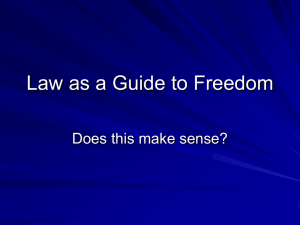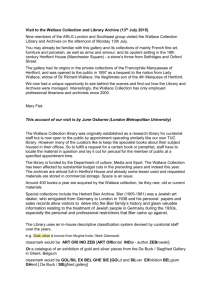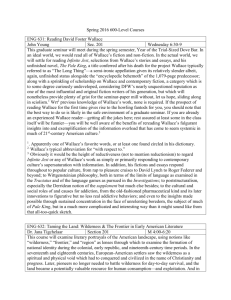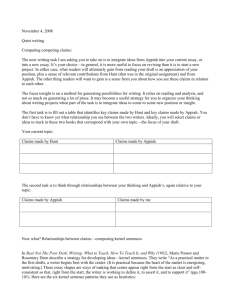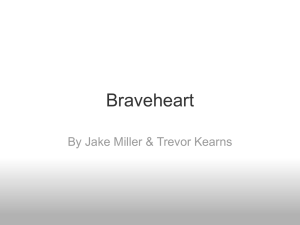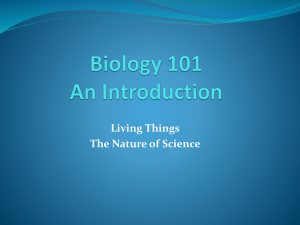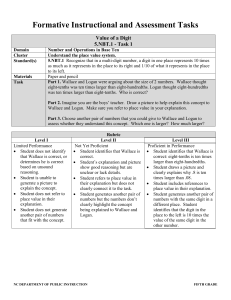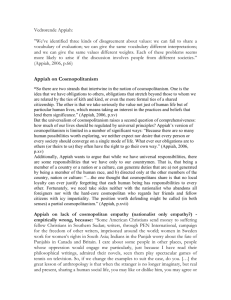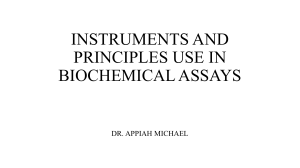Revised - Robin`s UW Portfolio
advertisement
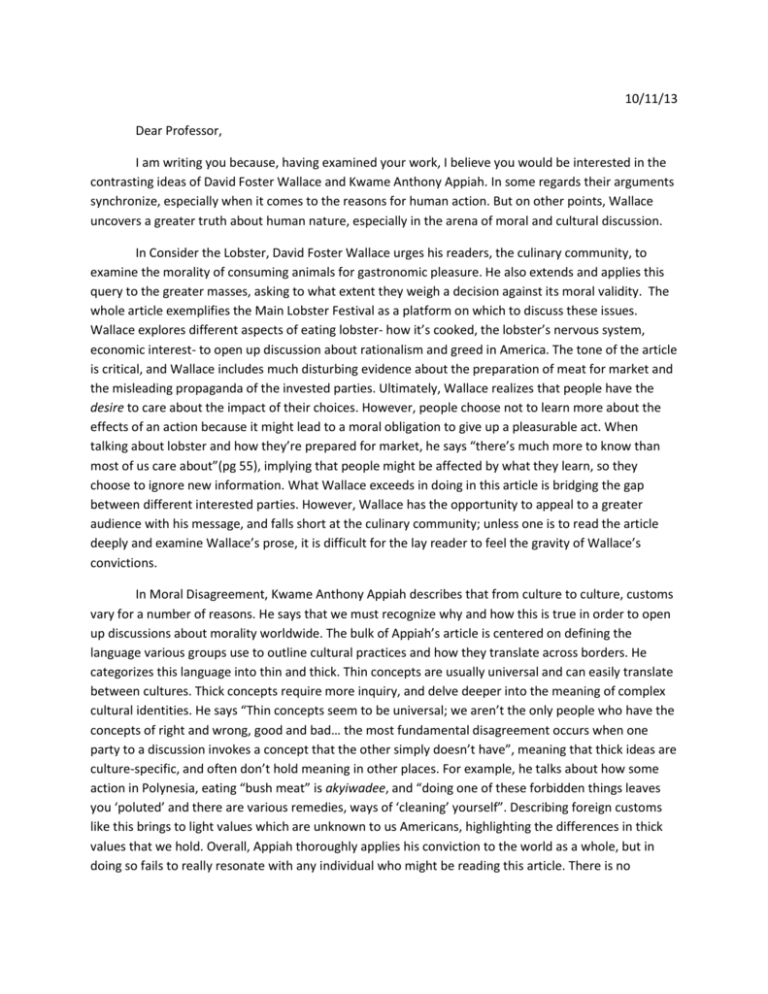
10/11/13 Dear Professor, I am writing you because, having examined your work, I believe you would be interested in the contrasting ideas of David Foster Wallace and Kwame Anthony Appiah. In some regards their arguments synchronize, especially when it comes to the reasons for human action. But on other points, Wallace uncovers a greater truth about human nature, especially in the arena of moral and cultural discussion. In Consider the Lobster, David Foster Wallace urges his readers, the culinary community, to examine the morality of consuming animals for gastronomic pleasure. He also extends and applies this query to the greater masses, asking to what extent they weigh a decision against its moral validity. The whole article exemplifies the Main Lobster Festival as a platform on which to discuss these issues. Wallace explores different aspects of eating lobster- how it’s cooked, the lobster’s nervous system, economic interest- to open up discussion about rationalism and greed in America. The tone of the article is critical, and Wallace includes much disturbing evidence about the preparation of meat for market and the misleading propaganda of the invested parties. Ultimately, Wallace realizes that people have the desire to care about the impact of their choices. However, people choose not to learn more about the effects of an action because it might lead to a moral obligation to give up a pleasurable act. When talking about lobster and how they’re prepared for market, he says “there’s much more to know than most of us care about”(pg 55), implying that people might be affected by what they learn, so they choose to ignore new information. What Wallace exceeds in doing in this article is bridging the gap between different interested parties. However, Wallace has the opportunity to appeal to a greater audience with his message, and falls short at the culinary community; unless one is to read the article deeply and examine Wallace’s prose, it is difficult for the lay reader to feel the gravity of Wallace’s convictions. In Moral Disagreement, Kwame Anthony Appiah describes that from culture to culture, customs vary for a number of reasons. He says that we must recognize why and how this is true in order to open up discussions about morality worldwide. The bulk of Appiah’s article is centered on defining the language various groups use to outline cultural practices and how they translate across borders. He categorizes this language into thin and thick. Thin concepts are usually universal and can easily translate between cultures. Thick concepts require more inquiry, and delve deeper into the meaning of complex cultural identities. He says “Thin concepts seem to be universal; we aren’t the only people who have the concepts of right and wrong, good and bad… the most fundamental disagreement occurs when one party to a discussion invokes a concept that the other simply doesn’t have”, meaning that thick ideas are culture-specific, and often don’t hold meaning in other places. For example, he talks about how some action in Polynesia, eating “bush meat” is akyiwadee, and “doing one of these forbidden things leaves you ‘poluted’ and there are various remedies, ways of ‘cleaning’ yourself”. Describing foreign customs like this brings to light values which are unknown to us Americans, highlighting the differences in thick values that we hold. Overall, Appiah thoroughly applies his conviction to the world as a whole, but in doing so fails to really resonate with any individual who might be reading this article. There is no compelling call to action or emotional connection to Appiah’s content that urges any one reader to apply the concepts of the article. In conjunction, the two help fill in holes in one another’s argument. For example, Wallace argues that many people don’t examine their actions because they are pleasurable. He says “the moral comparison here is… the value of one animal’s life vs. the value of on human’s taste for a particular kind of protein.”(pg 64) And yet “there’s much more to know than most of us care about”(pg 55). Here Wallace contrasts directly peoples pleasure vs. the affects of their pleasure. If people don’t know the affects, he says, they never have to make the comparison, thereby never having to sacrifice their pleasure. Enjoyment, therefore, is a key motivating factor in how people choose to live. Appiah corroborates that still other people do not examine refrain from an action because they get stuck on their instinctual disgust for that action. He says “ people are disgusted by the drinking of orange juice, that has had a cockroach in it, even if they know the cockroach was rigorously cleansed of all bacteria”(pg 142) This evidence shows that people have a tendency to listen more to their instinctual repulsion rather than reason and logic; repulsion says that cockroaches are gross and the juice should be left alone, where reason says that the juice is perfectly safe to drink. Tying these together, Wallace says that people ignore important information in order to justify doing an action, and Appiah says that people ignore pertinent information in order to justify not doing something. When combined, the two arguments solidly prove that some human instincts, such as hunger for lobster or disgust of bugs, serve as a barrier between people and the reasons behind their actions. Also, Appiah has one oversight that Wallace heavily underlines in his essay. Appiah assumes that most people want to have intercultural discussions about our motives behind an action, but Wallace points out that for most people this is an uncomfortable endeavor. Appiah says “It’s often part of our understanding of these terms that their applications are meant to be argued about”( pg. ). In this instance “terms and their applications” refers to our cultural codes and how we live them. This statement makes it sound easy to discuss differences of opinion from one person to the next as though it were a daily occurrence. The word “meant” conveys “purpose”, sounding as though Appiah expects people to feel the obligation to discuss their differences and the reasons why they stick to cultural mores. But Wallace counters with, in the case of the MLF, “The truth is that if you… permit yourself to think that the lobster can suffer and would rather not, the MLF can begin to take on aspects of something like a Roman circus” (pg.) and that on the whole, it is uncomfortable to reveal truths about our actions, especially if it relates us to “a Roman circus”, and that most would rather leave that arena of conversation unmolested. Delving into deeper comparisons uncovers dark truths about our unjust or unreasonable actions, and that’s something very few willingly expose about themselves. I hope these points open up some conversation for you. I would be interested in what you have to say, and if your analysis on their contrasting arguments differs from my own. Please write back with your thoughts. Sincerely, Robin Hunt P.S. This letter addresses 2nd outcome because it facilitates conversation between two texts In addition it uses evidence from the two texts to support my central claim about their effectiveness in relation to each other.


